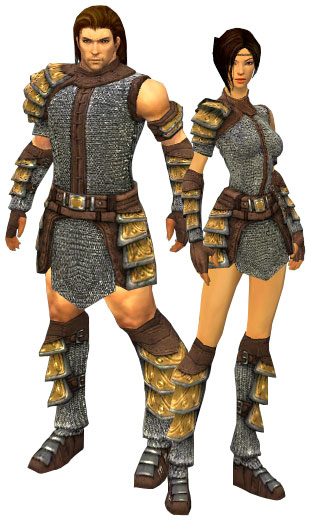
Warriors rely on stout hearts, brute strength, and melee weapons to subdue their enemies and protect their allies. They generally disdain long-range warfare, preferring instead to charge directly into the fray swinging their weapon of choice. They can take a beating unlike anyone else. Warriors are equally comfortable wielding axe, hammer, or sword, though many choose to master one weapon over all others. Many Warrior skills require adrenaline, which builds up during combat to enable those skills, and usually results in major damage. Defensive tactics help the Warrior to avoid damage and protect allies, but Strength is the Warrior’s biggest asset, allowing this hero to do more damage with every attack.
Warriors are the primary frontline characters, combining heavy armor with melee attacks. Warriors can tank effectively by virtue of their high AL, enabling allied casters to deal damage undisturbed and taking pressure off healers. Warriors can also be DPS machines, well suited to applying pressure and spiking. While warriors do have some damage prevention abilities, they lack self heals. Many warrior skills (offensive and defensive) are adrenaline based, compensating for their limited energy pool.
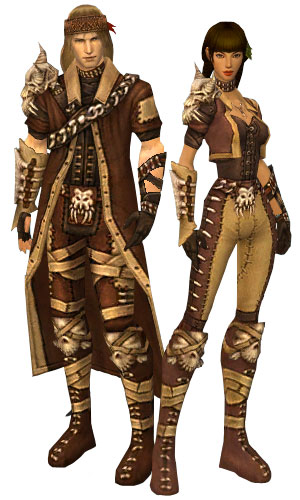
Rangers are unique in their ability to succeed with the help of, or even in spite of, their environment. Nature rituals allow them to manipulate the environment to hinder their enemies, or borrow the very power of creation to heal and aid their allies. They favor long-range combat, the bow being their weapon of choice, and can be especially effective from elevated locations such as bridges and cliffs. They are the only profession with the ability to charm animals, which then accompany them on their travels and assist them in battle, gaining experience and levels over time. Rangers are also blessed with survival skills that help keep them alive by causing regeneration of health.
Rangers are an extremely versatile profession, able to support combat operations by delivering precise long-range fire on selected targets, while denying the enemy freedom of movement. Their roles vary as they can set traps to ambush unsuspecting foes, spam a variety of interrupts to neutralize casters, bring in a pet to add additional melee damage, spread conditions with numerous bow attacks and preparations, or simply focus on ranged damage per second with either their bow or reduced cost attack and touch-based skills. Rangers have great survivability, using a bow as their primary weapon will not only keep them at a safe distance, but Rangers also have decent armor versus physical damage and a high inherent armor bonus versus elemental damage. Rangers may also use numerous stances to block incoming attacks and increase both run and attack speed. Rangers have a unique ability to summon nature spirits that influence both friend and foe alike.
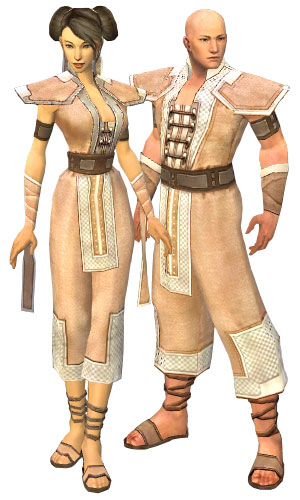
Monks employ a direct conduit to the gods, and the answers to their prayers come in the form of healing and protection for their allies and damage to their enemies. Combined with any other profession, Monks can alternate between supporting their party and dealing damage to opponents. Monks enjoy Divine Favor, which provides extra healing power, while their healing and Protection Prayers help to keep their allies strong and healthy. Smiting Prayers, on the other hand, call down divine anger on enemies, exacting holy damage that ignores armor, though damage-dealing is not the Monk’s specialty. What Monks lack in firepower they make up for with their unparalleled gift for keeping their allies alive.
Monks are the healing backbone of a party, keeping the other players alive and healthy. They get the unique Divine Favor bonus and two entire skill lines solely devoted to protecting and restoring those health bars. They also have the most hex and condition removal skills and the most resurrection skills.
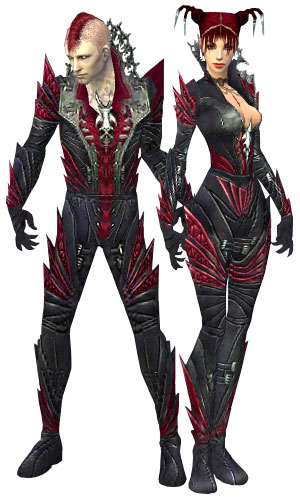
Necromancers, calling on the spirits of the dead, and even death itself, to overpower enemies and assist allies. In sacrificing Health and taking curses and diseases upon themselves, they can deal large amounts of damage to those foolish enough to oppose them. Dead and dying enemies become unwilling allies in their hands. Necromancers have the singular ability to absorb Energy from an enemy’s death, and can raise a fighting force from the corpses of their foes. Curses, which often cost the Necromancer dearly, exact an even greater toll from enemies, who find that their Enchantments and healing skills are rendered useless. Due to the sacrificial nature of their methods, Necromancers must practice patience and self-discipline to survive.
The Necromancer is an extremely flexible profession that can fulfill a variety of roles. The major roles expected of necromancers currently in PvE are Spiteful Spirit necromancers (also called SS), Minion masters (MM for short), Blood is Power (or BiP for short), and in certain cases Spoil Victor necromancers (SV for short). Major roles expected of necromancers in PvP currently are Hex shutdown, and Orders. However these popular builds only show a fraction of what necromancers are capable of. Because of their popularity it is advised to tell your team when you plan on doing something else, such as healing or using secondary skills.

Mesmers are masters of illusion and control, subverting the enemy’s Energy for their own use, and that of their allies. Combined with any other profession, their skills provide excellent support, turning enemies’ powers against them and changing the very fabric of reality to hinder foes and help allies. Mesmers have the ability to cast spells quickly, which can make all the difference in the heat of battle. Their powers of domination allow them to take control of enemy skills and Energy. Their unique illusionary talents can slow or even halt enemy movement and skill casting, or cause imaginary illnesses that drain Health and Energy from foes while healing and energizing allies. While Mesmers are not known for brute strength, their ability to confuse, distract, and drain the enemy’s resources more than compensates.
Mesmers are often called the most difficult profession to play in Guild Wars, but if played well, can cause a lot of trouble for the enemy. They are best described as the debilitating or the saboteur profession that eschew outright attacks; they instead use misdirection against the foolish and rely on control-based abilities to sap foes of their strength. They can be used to their highest potential when played in a group.
Knowing your enemy as well as yourself is the path to victory for Mesmers, whose primary function is to control the enemy's agenda. Mesmers enjoy a vast array of tools to disrupt or turn enemy actions against them, as well as more standard degenerative and nerfing skills. Mesmers can push out enormous armor ignoring damage and influence the outcome of the battle with a single well-placed spell. A Mesmer can shut down enemies by interrupting their actions, disabling their skills and removing their adrenaline and energy. They can also cause health degeneration and afflict hexes that reverse the advantages of foes into liabilities, and apply a wide range of conditions. A Mesmer can even use someone's own energy against them (with skills like Energy Burn).
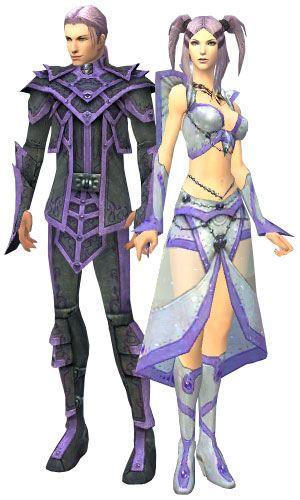
Elementalists summon the powers of earth, air, fire, and water and command them at will. They can inflict more damage in a single strike than any other profession. Earth Magic summons quakes and eruptions, encases enemies in stone, or protects allies. Air Magic harnesses the power of tempests to strike foes down with lightning or enable allies to run like the wind. Fire Magic manifests flames, fireballs, molten lava, and even meteors to burn enemies to a crisp. Water Magic conjures mist and ice to slow enemy movement and attacks, blur vision, protect allies against magic, and inflict cold damage on enemies. Elementalists have access to Energy regenerating skills, and when chosen as a primary character, they can increase their maximum Energy over time. The wise Elementalist avoids becoming surrounded, but keeps a local area-of-effect spell on hand just in case.
The Elementalist commands the four elemental forces: earth, air, fire, and water. With magic derived from the very foundations of nature itself, Elementalists can inflict more damage in a single strike than any other profession. There are as many types of Elementalists as there are elements and ways to combine them. Some Elementalists choose to study two or more elements to maintain broad discipline, though many prefer to focus on one unique element. Earth magic triggers quakes and volcanoes, envelopes foes in solid rock, and can add to the strength and stamina of allies. Air magic is driven by the power of storms and lightning, granting allies greater speed or targeting specific foes with a focused, high-damage attack. Fire magic is often considered the most purely destructive form, inflicting searing pain and damage on multiple enemies. The magic of Water is highly manipulative. Water magic summons ice and mist to slow enemies down and blur their vision, inflicts freezing cold damage, and even protects allies from other forms of magical attack.
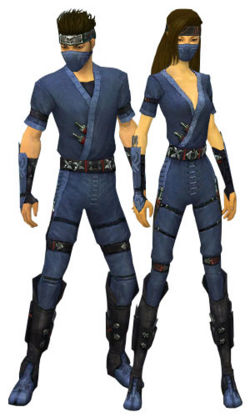
Assassins walk the shadows, deadly vipers ready to strike at the heart when the enemy least expects it, nowhere and everywhere all at once. Assassins are masters of their chosen weapon, the dagger, and are expert at inflicting Critical Strikes that cause massive damage. The Assassin is trained to efficiently link attacks together in a chain that does not give the enemy a chance to hit back. They have mastered the ability to move as shadows—Assassins wear only lightweight armor and prefer to avoid damage by not being there when the enemy’s strike lands. Their other magical skills include Hexes that lower the target’s defenses and protect the Assassin from harm.
Assassins are masters of their chosen weapon, the dagger, and are expert at inflicting Critical Strikes that cause massive damage. They are swift melee strikers who are meant to get in and get out, inflicting massive damage quickly with multiple hits. The Assassin is trained to efficiently link attacks together in a chain that does not give the enemy a chance to hit back. They have mastered the ability to move as shadows—Assassins wear only lightweight armor and prefer to avoid damage by not being there when the enemy’s strike lands. Their other magical skills include hexes that lower the target’s defenses and protect the Assassin from harm.
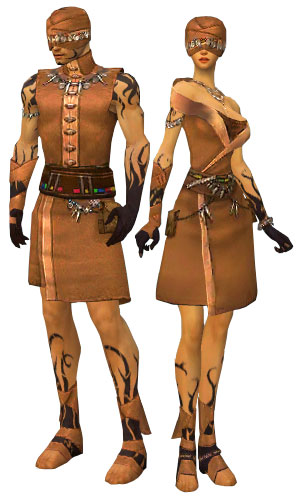
Ritualists channel other-worldly energies that summon allies from the void and employ mystic binding rituals that bend those allies to the Ritualist's will. They hood their eyes to better commune with spirits that grant great power and protection to Ritualists and their comrades. The energy they channel drives Ritualist skills which enhance the deadliness of an ally's weapon and wreak havoc on an enemy's health. The Ritualist can also use the remains of the dead to defend the living-not by reanimating corpses as a Necromancer would, but through the ritual use of urns and ashes. Where the Ranger lives as one with the spirit world, the Ritualist can and will be its master.
Ritualists often find themselves in versatile support roles for the team that allows them to wield synergistic abilities that enhance the offensive and defensive capabilities of the party. They are unique in their ability to create spirits that will actively protect and heal allies or damage and debilitate foes (compared to Ranger spirits which all have a global, passive effect). These bound tortured souls will assist the party in combat, offer up life-sustaining aid, and attract the ire of aggressive enemies to take some heat off your back. They are armed with weapon spells that enchant an ally's weapon instead of the person, thus avoiding the possibility of being disenchanted by foes. They also may cast item spells to summon ashes of long dead heroes which aid the Ritualist while the urn of ashes is held or when the urn is dropped. Ritualists also come with a variety of direct damage spells, condition spells, hex spells, healing spells, and summoned creatures interaction spells; allowing them to fill gaps in a party as true team players. In short, no group of adventurers should be without the ritualist's powers.
In PvP, Ritualists often use their spirits to influence the battlefield. Supportive spirits can create a safe zone to help mitigate damage, taking the pressure off the team's primary healers. Offensive spirits can create danger zones, resulting in a source of constant, armor-ignoring damage against those who enter their long attack range.
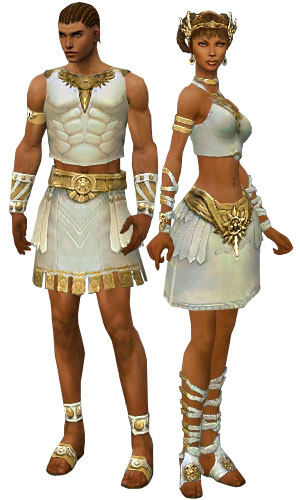
Paragons are the guardian angels of Elona, humanity’s champions against malefic threats. They rally the valiant with Shouts and Chants, aiding heroes, henchmen, and other adventurers through inspiration and motivation. A Paragon’s best weapons rely on an insightful mind, a courageous spirit, and a charismatic voice. Many Paragons also arm themselves with a spear and shield, striking from a distance as they shout their battle cries. Through insight, they help others resist Hexes and Conditions, echoing their commands across the field of battle (in fact, some “Echo” abilities renew themselves each time a Chant or Shout ends). When all hell breaks loose, a commanding Paragon shines as a beacon of light, driving back the forces of darkness.
Paragons are ranged support fighters, who specialize in Spears, and several forms of vocal commands, usually Chants, Echoes, and Shouts. Paragons benefit from their primary attribute, Leadership, which gives them energy depending on party size when using their vocal skills and allows these Great Leaders to inspire greatness in others
Effective paragons hardly ever run out of energy. The use of adrenaline chants/shouts, to gain extra energy with the leadership attribute, should be utilized. Also, because of the wide variety of chants/shouts, and the high armor of 80 (plus an additional 16 if including the shield), paragons can make avid healers.
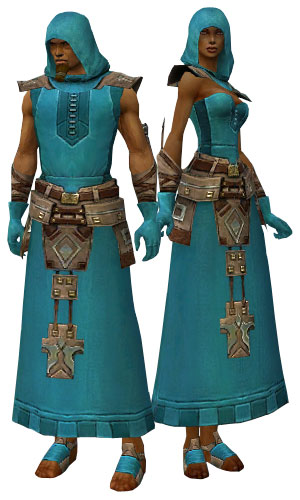
Dervishes, serving the gods as holy warriors, stand confidently in the whirlwind of conflict. Martial techniques perfected in the deserts of Elona allow a Dervish’s scythe to lash out quickly at multiple opponents, surrounding the holy warrior with a swath of destruction. Initiates often learn spells of self-protection, prayers that rush a combatant into battle, and invocations that empower attacks with elemental fury. Masters of the profession can assume the form of a god, enacting divine will with holy blessings. Keenly aware of the conditions of a fight, a Dervish can reap great benefits by using multiple Enchantments. Wandering the savannahs and deserts of Elona, the faithful Dervish chants prayers to the earth and wind... and the fury of the sandstorm answers in response.
Dervish attributes tend to be less narrow than those of core professions. All dervish attributes include some ability to inflict conditions, a few ways to deal damage, and one or two utility/self heals. All attributes except Scythe Mastery also offer flash enchantments as part of the dervish's feeder mechanic and the vast majority of dervish powers offer multiple effects when the feeder mechanic is fully utilized. Dervishes have very limited forms of energy management from their Primary Attribute, Mysticism, which only reduces the energy cost of dervish enchantment spells. However, like the warrior and paragon, many of their attacks use adrenaline rather than energy, which allows the dervish to function efficiently even with limited energy. Additionally, in PvE Mysticism also provides an armor bonus while the dervish is enchanted which helps them survive longer in PvE than PvP.
The dervish has a diverse mix of skills across all attributes, which results in them coming closest to playing as a "red mage", "magic knight" or "spell-blade" in Guild Wars without needing to dip into a secondary profession. With their solid focus on pressure they avoid the watered down "jack-of-all-trades" issue which typically plague diverse jobs/classes/professions in other games. What this does do is allow dervishes the flexibility to, in rare cases, fill in for the roles as tanks, utilizing protective enchantments like Armor of Sanctity; runners, most notably on the "Droks run", using skills like Enchanted Haste, Fleeting Stability, and Pious Haste; and even as healers, using Signet of Pious Light, Mystic Healing, and Imbue Health. However, this also makes the dervish one of the more complicated and difficult profession to play and isn't ideal for inexperienced players.
No comments:
Post a Comment